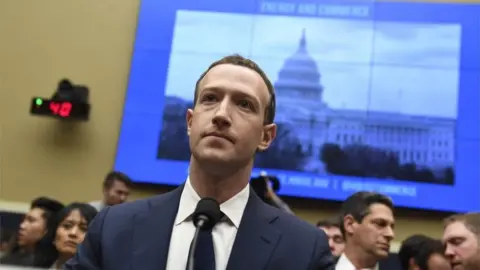Facebook to vet UK political ads for May 2019 local elections
 Getty
GettyFacebook's chief technology officer is to promise MPs that the social network will act to make political advertising far more transparent for UK users.
Mike Schroepfer will say that his firm will be ready to authorise ads in time for England and Northern Ireland's May 2019 local elections.
He will make the pledge while giving evidence to a parliament committee.
Facebook had previously committed itself to similar action in the US later this year.
Mr Schroepfer is being questioned as part of the Department of Culture, Media and Sport Select Committee's inquiry into fake news.
But the politicians also want to know more about the leak of Facebook data to the political consultancy Cambridge Analytica.
The committee had wanted to hear from Facebook's founder and chief executive Mark Zuckerberg.
However, he opted to send other executives to answer questions from politicians outside the US, having given two days of testimony in Washington earlier this month.
Advert archive
In his opening remarks, Mr Schroepfer will tell MPs that he and his boss are deeply sorry about what happened with Cambridge Analytica, which he will describe as a breach of trust.
He will also promise to deploy a new "view ads" button in the UK by June 2018, which will let members see all the adverts any page is showing to users via Facebook, Messenger and Instagram. The company first launched the facility in Canada last October.
 Getty Images
Getty ImagesIn addition, Mr Schroepfer will promise the following will be up and running in time for the 2019 local elections:
- political ads will only be allowed if they are submitted by authenticated accounts
- such ads will be labelled as being "political" and it will be made clear who paid for them
- the adverts will subsequently be placed in a searchable archive for seven years, where information will be provided about how many times they may have been seen and how much money was spent on them
But MPs are likely to have questions about the use of Facebook in past elections, notably the EU referendum, and whether there was any foreign involvement.
They will also want to drill down into the Cambridge Analytica affair and find out whether Facebook has uncovered similar cases during an audit of developer behaviour.
